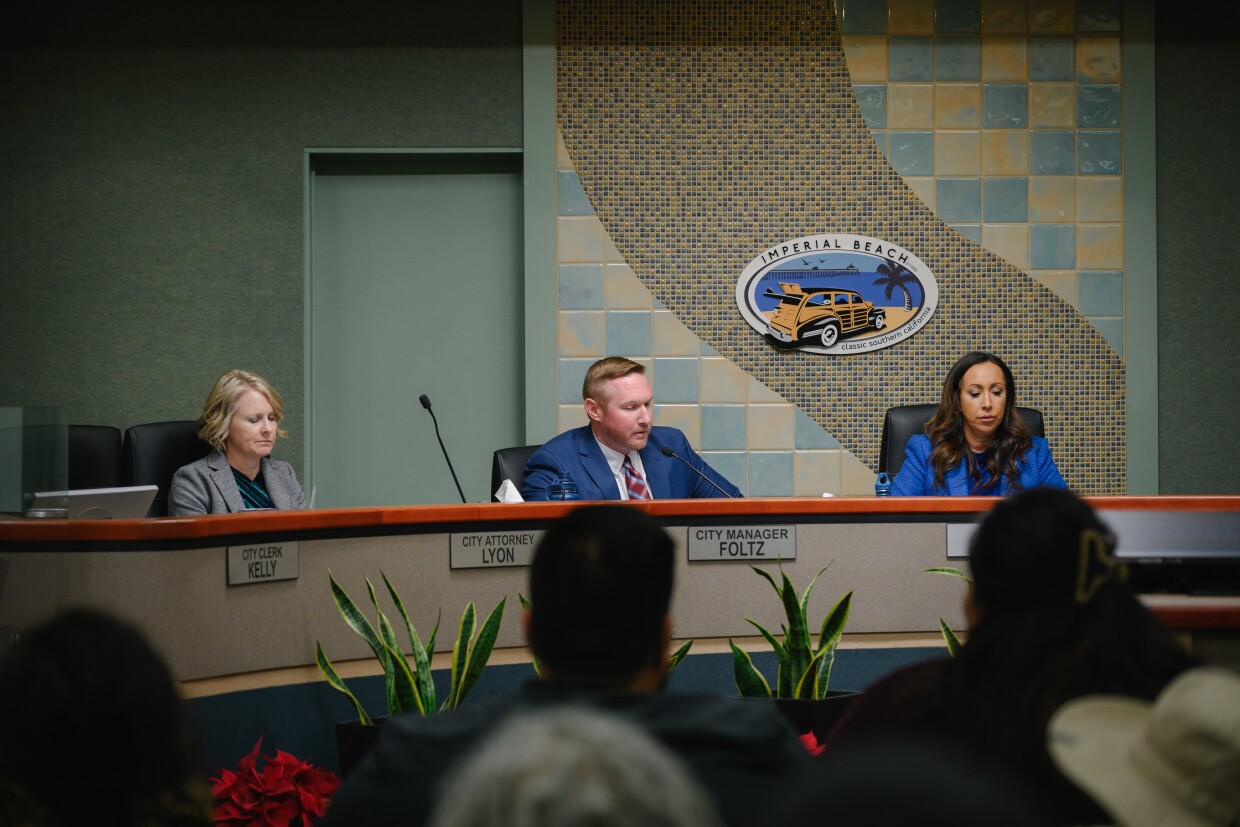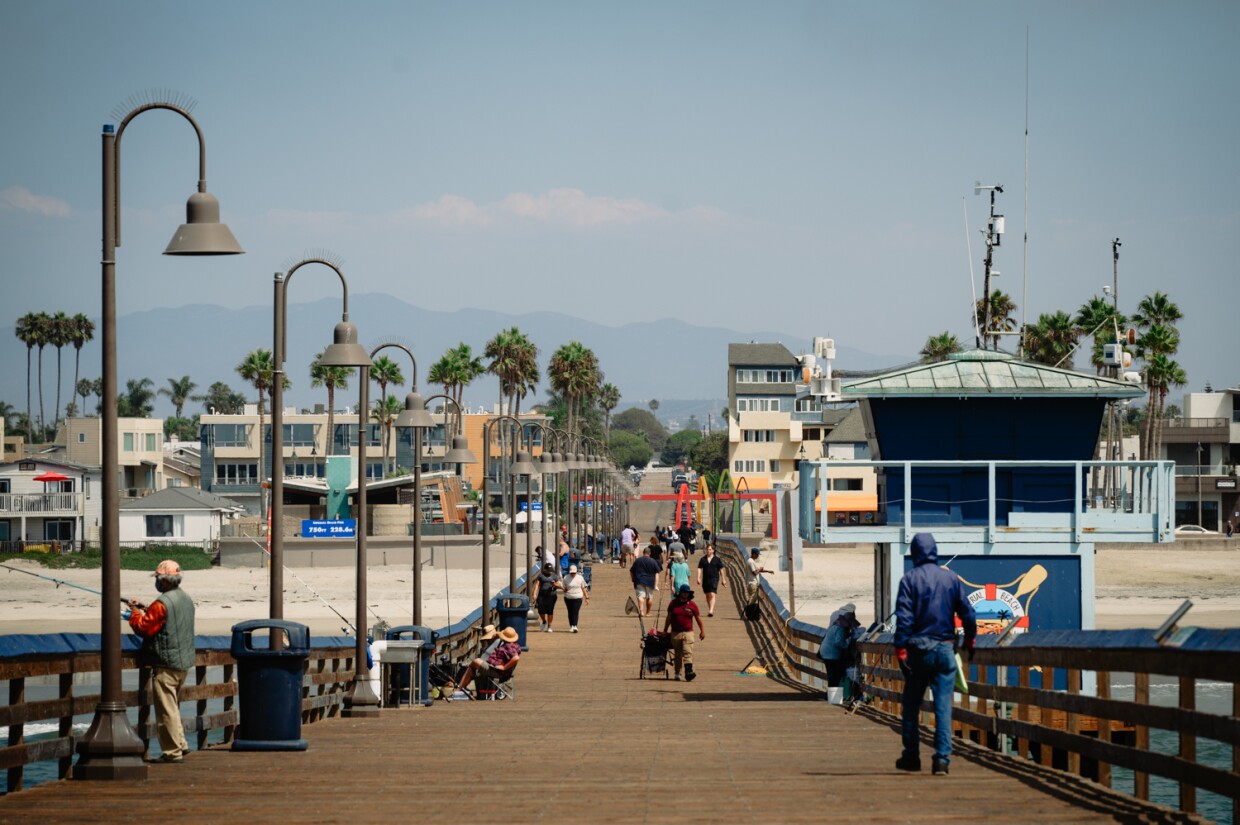The Imperial Beach City Council Wednesday proposed a set of new tenant protections in response to a mass eviction at the Hawaiian Gardens apartment complex in October.
The ordinance, introduced during the Council’s regular meeting, would restrict substantial remodel evictions — a specific type of eviction that many tenants and their advocates say is enabling the displacement of longtime residents. It would also require landlords to report eviction data to the city.
The ordinance would not ban substantial remodel evictions outright. It also does not include an emergency halt on any ongoing eviction cases, something many tenants had hoped for.
That means dozens of renters at the 64-unit Hawaiian Gardens building are still facing eviction. Many have already been forced to move out and seek housing elsewhere.
In the weeks since city leaders began considering protections, the owners of a second apartment building, which used to be called Sussex Gardens and is now called The Swell, also began issuing eviction notices for remodeling.
Swell resident Brenda Bautista had sounded alarms for months that the new owner of their building, a San Diego-based private equity investor called DMJ Capital, was planning evictions soon. Last week, she received her own notice to move out by March.
“It’s like our elected officials turned their backs on us,” Bautista told KPBS in an interview after Wednesday’s meeting.
During the meeting, Imperial Beach Mayor Paloma Aguirre apologized to residents of both buildings, her voice breaking. She said a stronger ordinance might not have had enough support among councilmembers.
“I think it’s clear that we got as far as we could for this particular ordinance,” Aguirre said. “It’s not what many of you for months have asked for or needed. But in my opinion, it’s something.”

The threat of mass evictions at the two neighboring apartment complexes has gripped public meetings in Imperial Beach since late October.
Landlords and several real estate industry groups, like the California Apartment Association and the Southern California Rental Housing Association, have shown up to council meetings and argued fiercely against new protections. Speakers said most property owners were well-meaning and that stricter regulations would make it harder for them to improve aging buildings and keep rents low.
Meanwhile, tenants and their advocates, including Alliance San Diego, the Legal Aid Society of San Diego and the mayor of Lemon Grove, have urged Imperial Beach’s elected officials to consider the disruption and trauma evictions can cause for working families. They said councilmembers should ban substantial remodel evictions completely.
Even the limited ordinance divided the City Council on Wednesday.
The proposed law would tighten the definition of substantial remodels and raise the amount of rental assistance that landlords of large apartment buildings need to provide.
Councilmember Mitch McKay argued that state legislators should be the ones to set the standard for tenant protections, not local officials. Councilmember Carol Seabury said she thought property owners were being unfairly criticized.
“Generational wealth is not a bad thing,” Seabury said.
Several councilmembers have also repeatedly voiced concerns that the city could be sued by major real estate companies.
Imperial Beach has faced at least one legal threat from a property owner. In a letter to the city manager last month, Dan Feder, the new owner of the Hawaiian Gardens apartments, warned that his company was prepared to take legal action.
“We will vigorously defend our rights and reputation, if necessary,” wrote Feder, the CEO of F&F Properties.
But councilmembers pointed out that state law explicitly allows local jurisdictions to adopt their own stronger protections.
“We are absolutely within our legal ability per the state law,” Aguirre said on Wednesday. “I just want to clarify that.”
Councilmembers Matthew Leyba-Gonzalez and Jack Fisher joined the mayor in supporting the proposed protections.

The debate has also raised bigger questions about the city’s identity.
Imperial Beach has long stood out as a diverse and largely working-class community. The small, beachfront city has a median household income of just over $79,000, and almost half of all residents identify as Latino.
A big part of that, tenants rights advocates said, has been the local cost of housing, which has remained relatively affordable even as it rose in other communities in the San Diego area. Tenants at Hawaiian Gardens and The Swell said their buildings were prime examples.
But the purchase of those complexes by real estate investors and the ensuing evictions have left many longtime Imperial Beach residents wondering whether they still have a place in the city.
"Our community’s fabric is unraveling," Hawaiian Gardens resident Joshua Lopez told the City Council in December. "People like me are being forced out, told implicitly that we no longer belong because we don’t belong to a certain economic status or class."
Lopez has since moved out of the building ahead of his eviction deadline but is still living in Imperial Beach.
Fisher suggested that rising rental prices are inevitable and that poorer residents may have to move elsewhere.
“We know that there’s many places in this country that are much cheaper to live than Southern California,” he said Wednesday.
But advocates said they were prepared to keep pushing for stronger tenant protections.
“I just think it means we need to keep fighting,” said José Lopez Aguino, San Diego director of the Alliance of Californians for Community Empowerment. “Empower people so they have the courage to come out and speak up.”
The City Council will vote on the proposed protections in the coming weeks.






